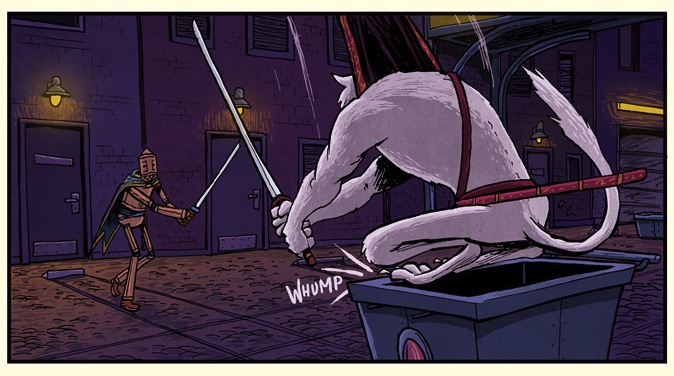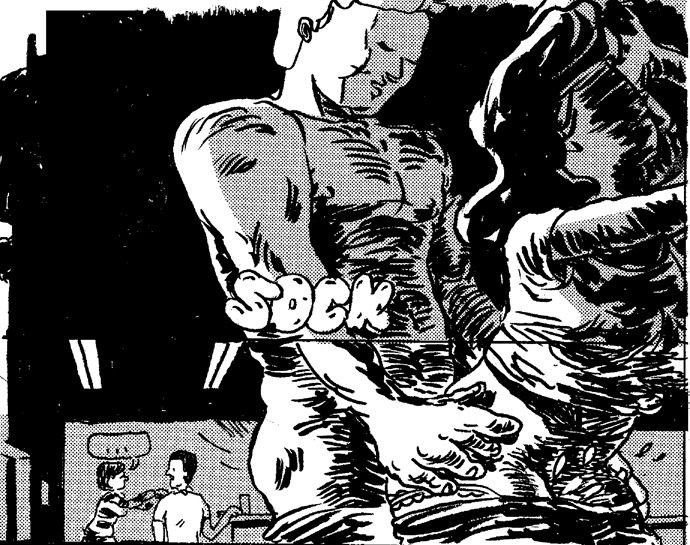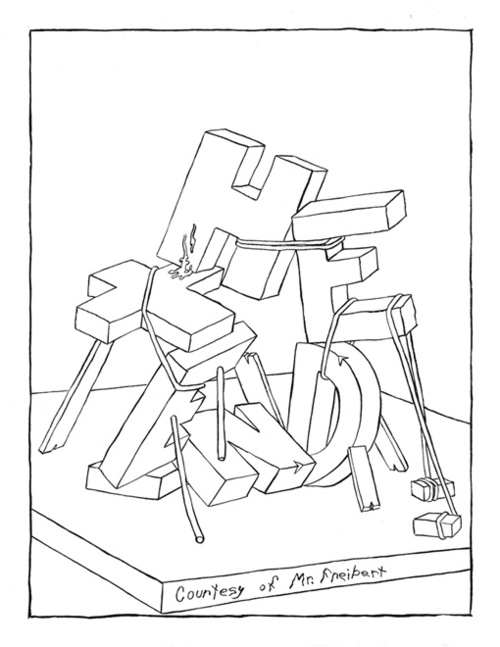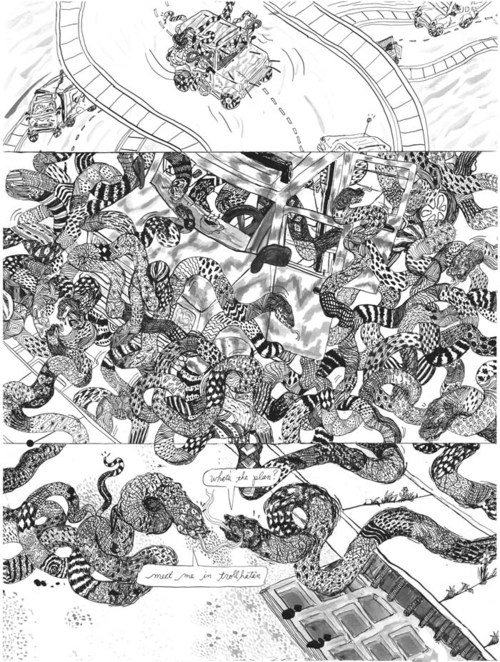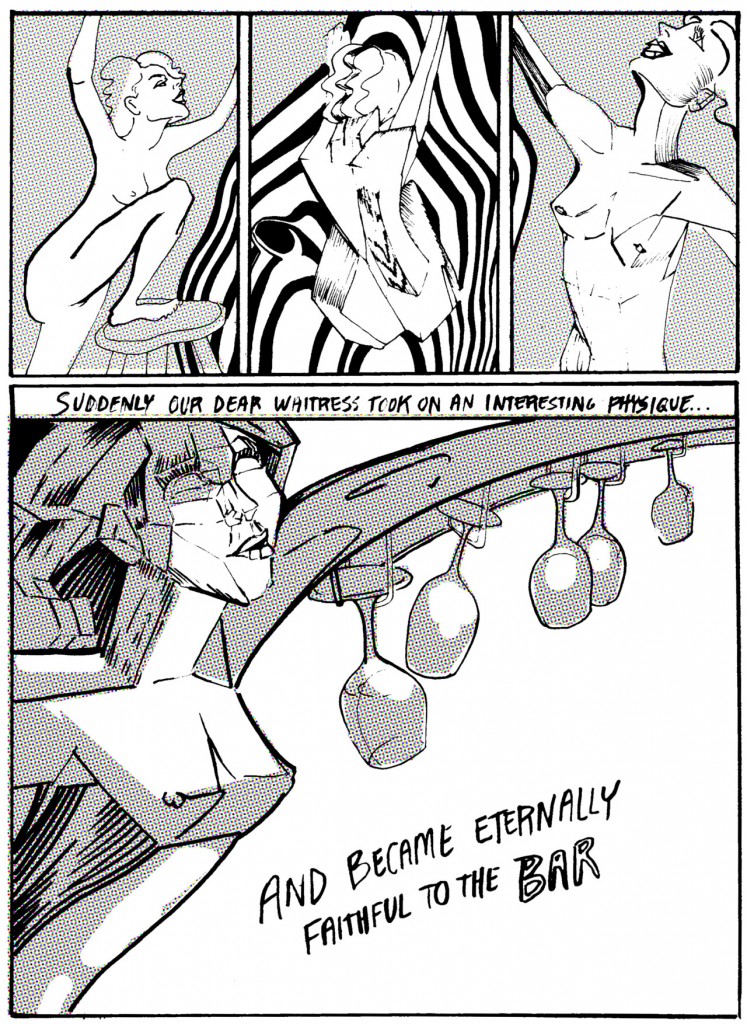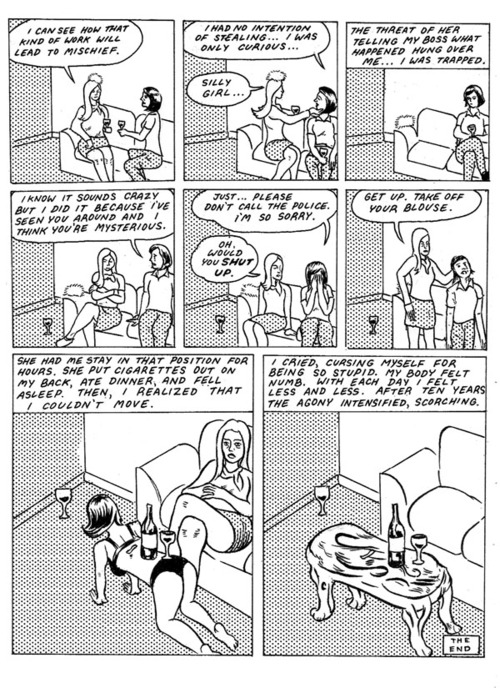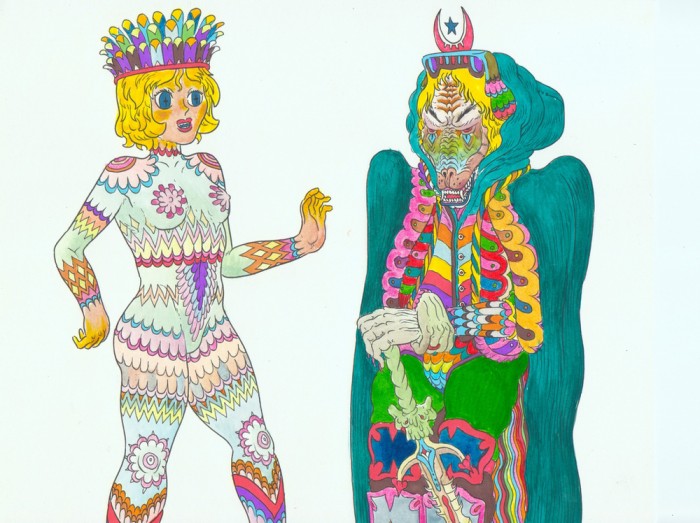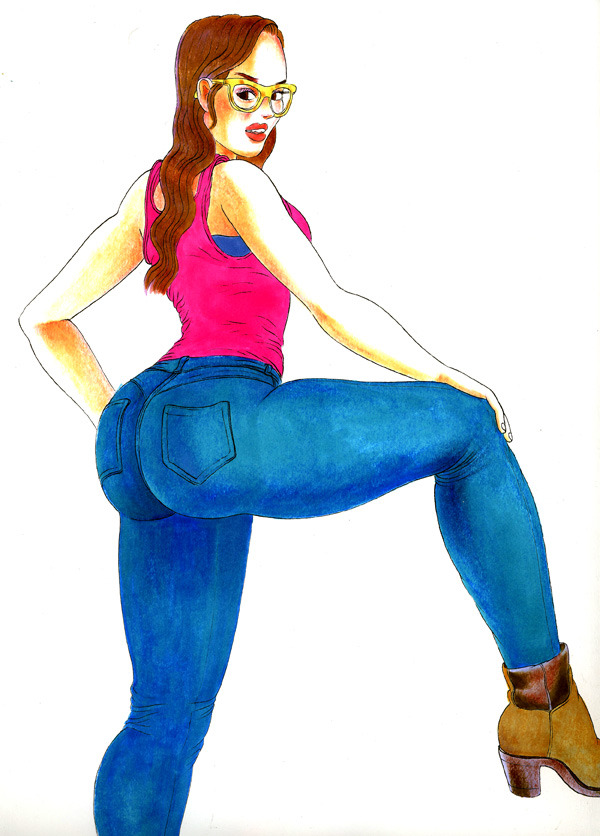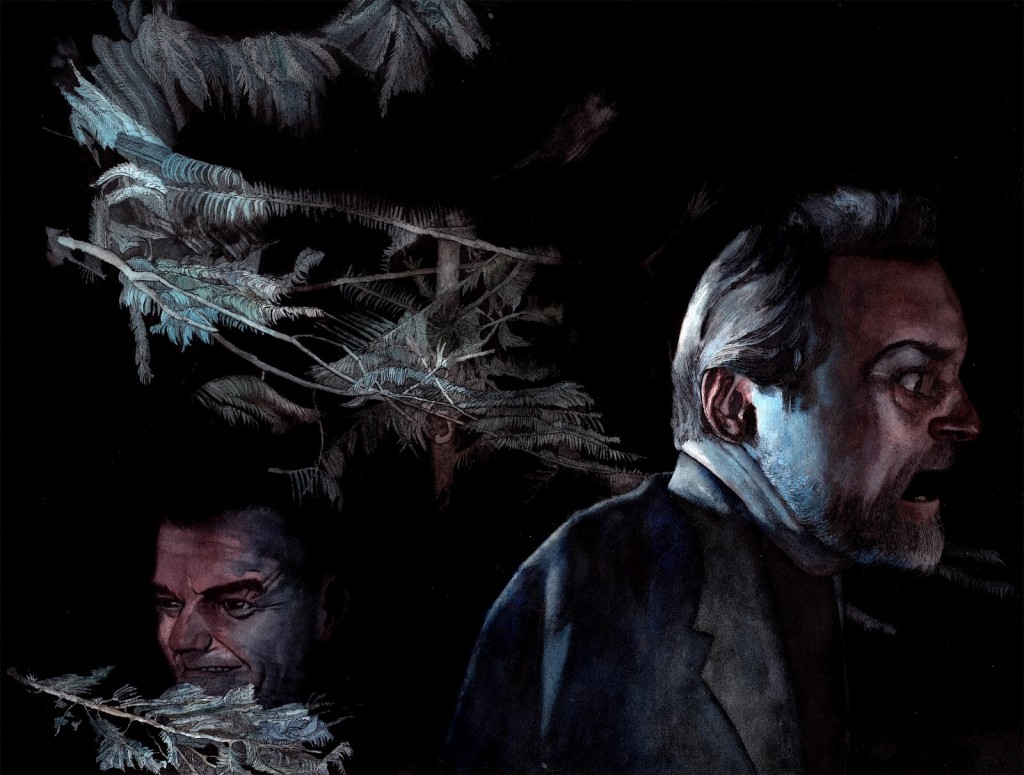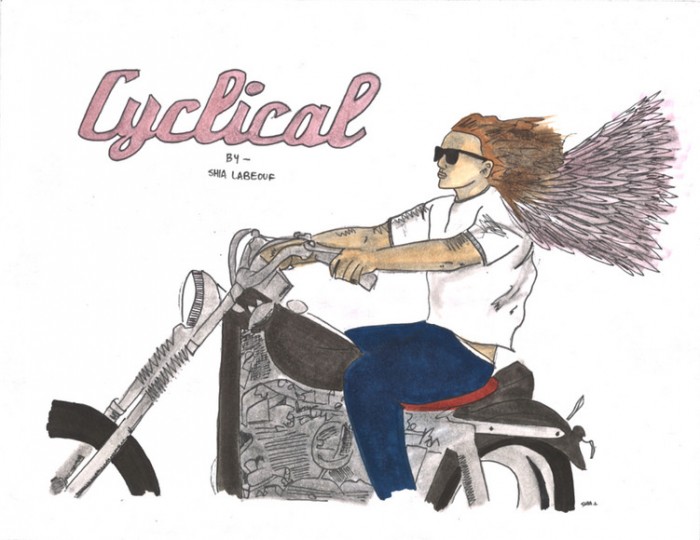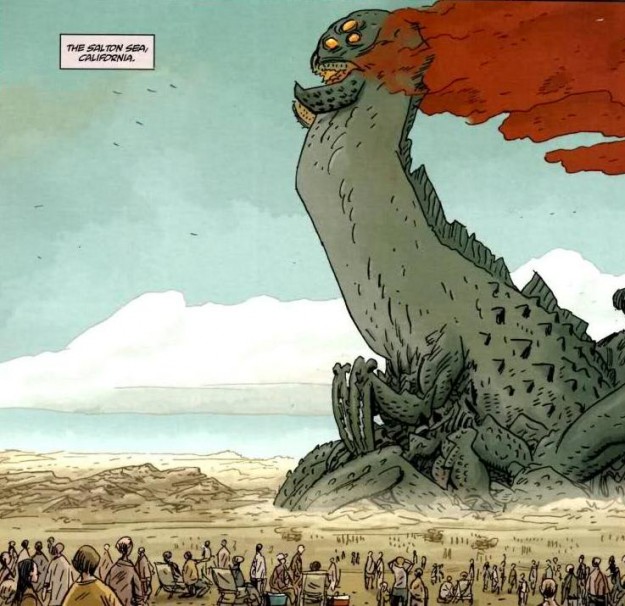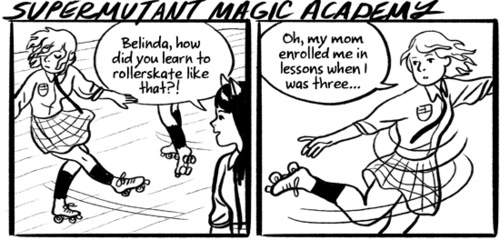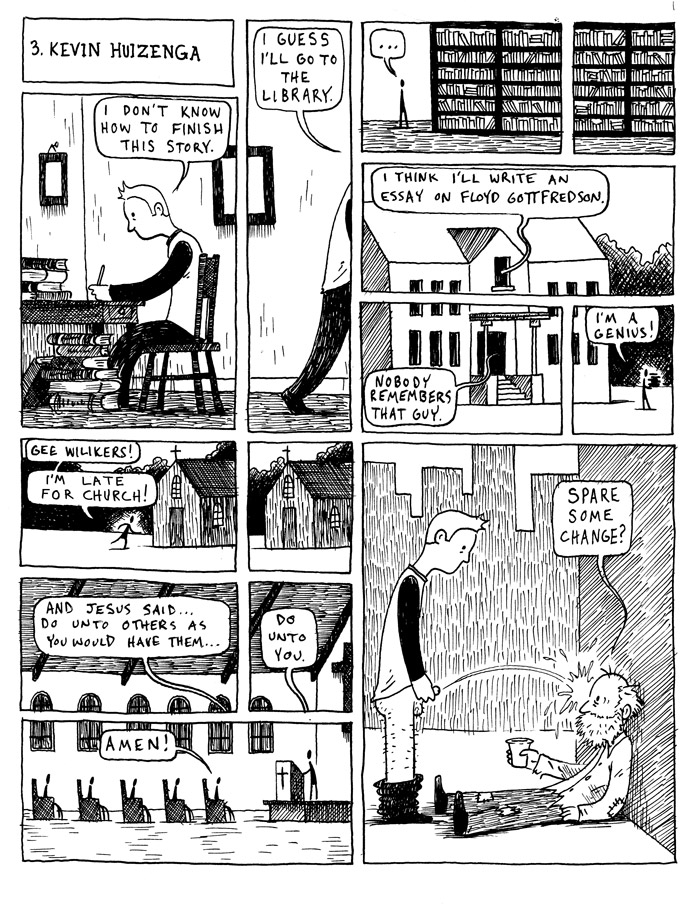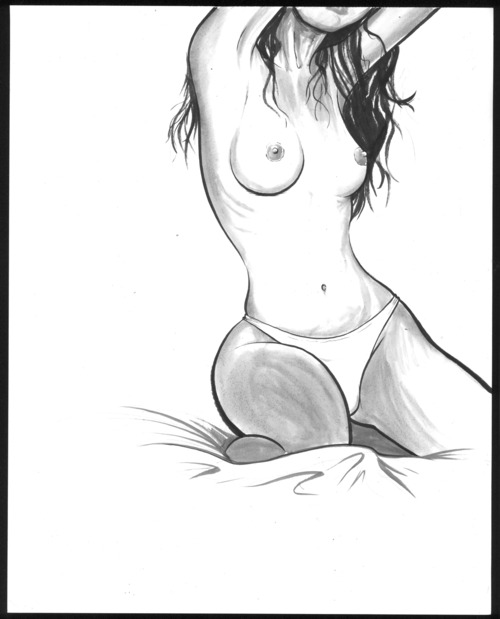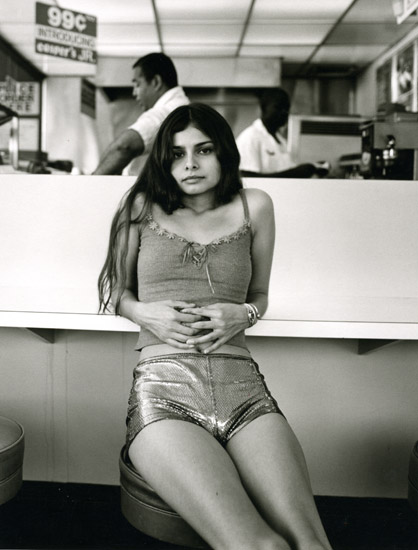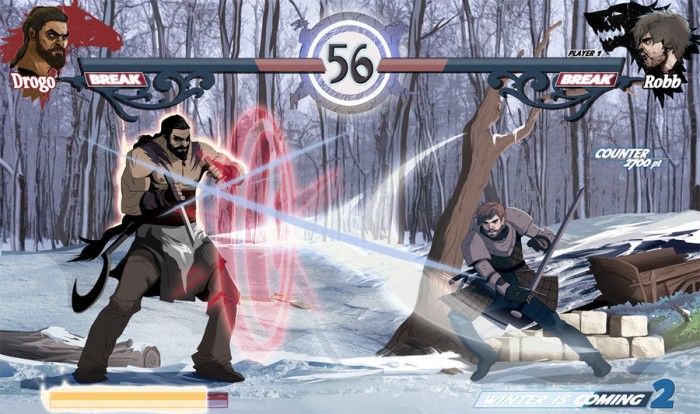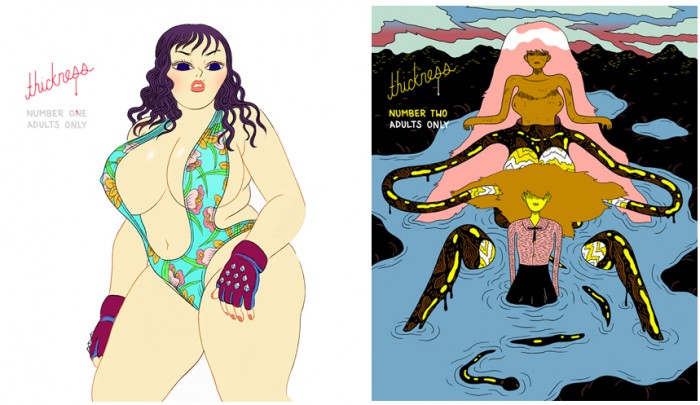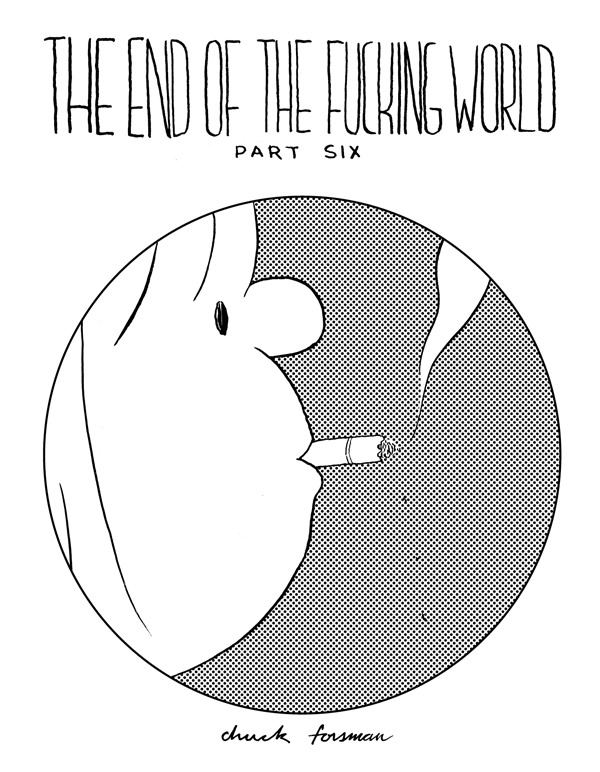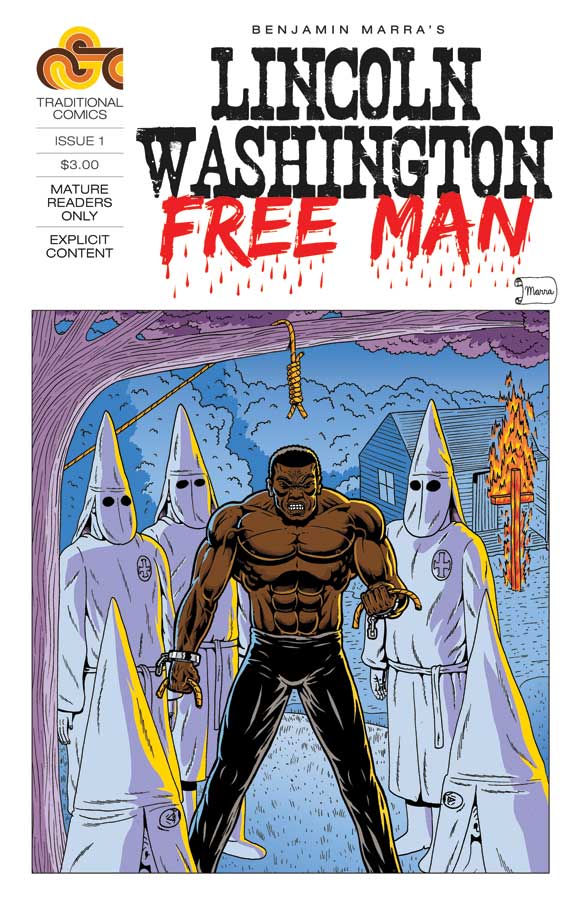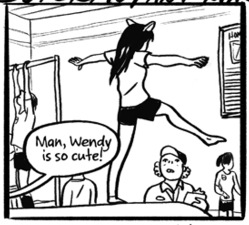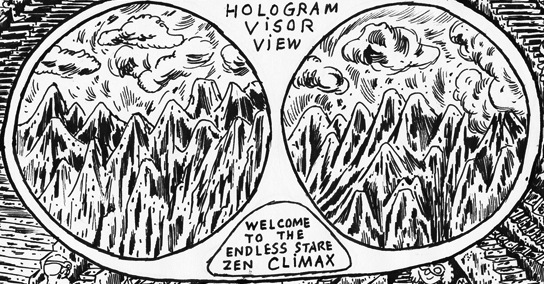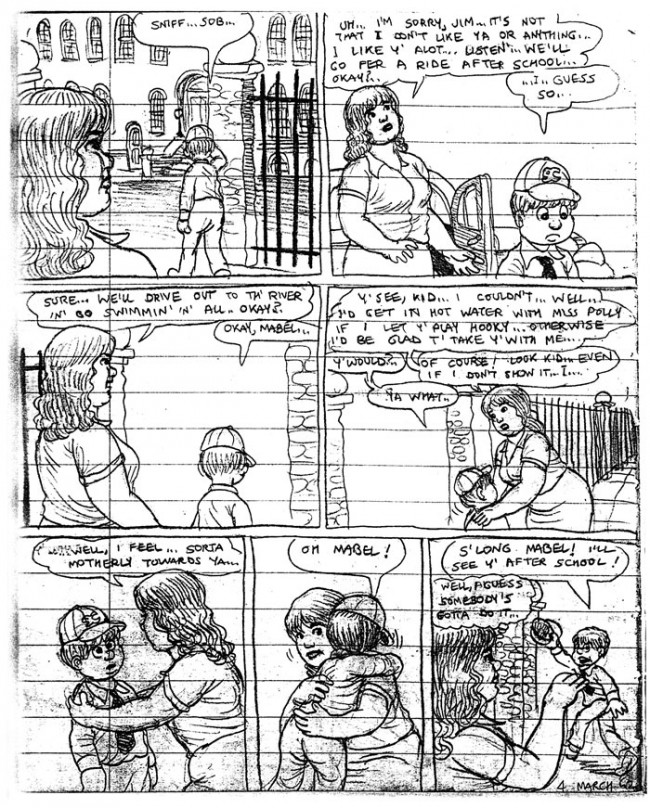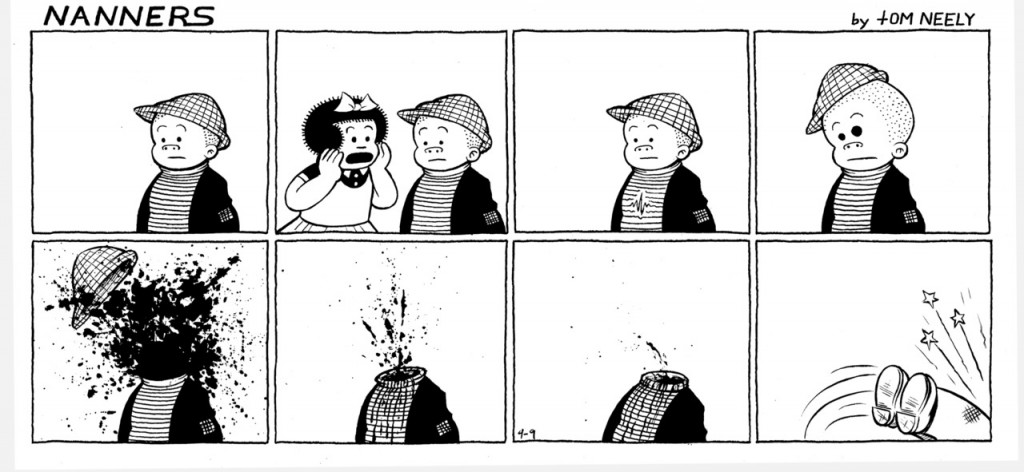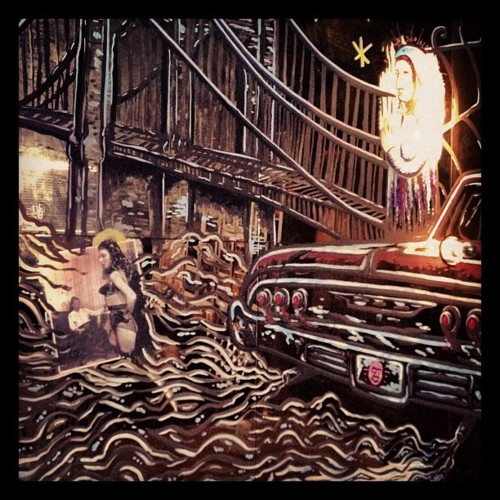For my recap/review of Game of Thrones Episode 15, please visit Rolling Stone.
The full Thickness
- Edie Fake
- Lamar Abrams
- Julia Gfrörer
- Jimmy Beaulieu
- Sean T. Collins / William Cardini
- Gengoroh Tagame
- A pinup by HamletMachine
- A new TRUE CHUBBO strip
- An Andy Burkholder mini supplemental
Turn me on, dead man!
Girls thoughts two
* And likely final. When your zeal for making your characters contemptible extends to not bothering to make them interesting to watch, ya blew it.
I understand how exciting it is to see yourself and your peer group represented on a show run by your peer group, and I like to think I can at least see what that would mean in gender terms from where I’m standing as a dude as well, though obviously I’ll never fully feel the impact of the gender disparity in pop culture the way the people on the losing end do. And I’m legit excited about the abortion storyline making it on to TV the way it did. But that’s about all this has going for it, best I can tell.
Lena Dunham aims for warts-and-all and winds up with all-warts, to the point where the characters are incoherent, and not in a Whitmanesque containing-multitudes way. That poor square virgin character, for example, reacts to the news that Hannah’s getting an STD test by saying “Fun!” and meaning it, at least until her friends talk her down. This is something no actual human being would ever say or think, but she does because we’re meant to find her ridiculous, and for Dunham any weapon to hand will do. Ditto whatsername, the one who’s not Hannah and not the British person and not the square virgin — she’s upset that she hasn’t had an unplanned pregnancy? How does that square with wanting her boyfriend to be less of a milquetoast? Or with, you know, being a recognizable human person? Comedy is obviously about exaggeration and distortion — see also the opening sex scene with Hannah’s grotesque fuckbuddy, which stacked the deck horrendously and wasn’t funny but which at least stemmed from familiar human behavior. Hannah’s friends, on the other hand, are just a collection of tics and neuroses and random embarrassing things (moving to New York because of Rent). That in turn made me less forgiving even toward the understandable caricaturing of the bit players.
Most fundamentally, though, once again I found myself sitting through a half-hour comedy during which I could count the laugh-out-loud moments on one hand with fingers to spare (for the record again: “What if I want to feel like I have udders? This woman doesn’t speak for me.” and “When they pull out, it’s fucking mayhem.”) Whatever else they’ve got going for them, whatever else they bring to the pop-culture table, horror is supposed to be scary, smut is supposed to be sexy, and comedy’s supposed to be funny. So, pass.
Hiss
Page seven of “Destructor Meets the Cats” has been posted.
You can read the whole story so far on one continuously scrolling page by clicking here.
Carnival of souls: Closed Caption Comics, Jonny Negron, Glenn Greenwald, more
* Sabrina, don’t just stare at the limited edition broadsheet collection of Benjamin Marra’s American Psycho illustrations, buy it.
* Chris Mautner reviews Guy Delisle’s Jerusalem and Jean-Pierre Filiu & David B.’s Best of Enemies, two nonfiction comics about the Middle-East by two world-class cartoonists. I look forward to tearing into both of them.
* Hooray! The Closed Caption Comics-anchored smut-comics anthology Sock is returning for another issue, featuring guest stars like Edie Fake, Andy Burkholder, and Anya Davidson. You can pre-order it at the link. (That’s from Ryan Cecil Smith’s contribution below.)
* More CCC news: Apparently Noel Freibert’s Weird anthology has a tumblr? (Via Shit Comics.)
* Still more CCC news: I’m quite excited for Difficult Loves, the debut full-length from Molly Colleen O’Connell, whom I believe is of mixed Portugese-Ethiopian-Maori-German extraction.
* Speaking of anthologies, I was happy to see that the crowdfunding project for the next issue Happiness was successful; here’s a page from contributor Krysta Brayer.
* Oh my, am I pleased to have made the acquaintance of the comics and short fiction of Aaron Shunga. (Via Shit Comics again.)
* Jonny Negron. Jonny Negron. Jonny Negron.
* “I Am the Arm” by Matt Rota, for the Twin Peaks: Fire Walk With Me art show at CoproGallery in Los Angeles.
* I’d actually intended to write about this project not at all, in any way, but oh well: Rob Bricken of Topless Robot speaks for a lot of people (ha, that’s not a sentence I get to write every day) in this piece absolutely laying into Before Watchmen, as well as the treatment of Jack Kirby vis a vis the Avengers movie, especially in the final sentence: “Hey Marvel and DC — it sure would be great to enjoy your products without feeling like an asshole.” Related: Tom Spurgeon on the implications of the recent dust-up between DC and writer Chris Roberson (when the latter announced his intention to stop working for the former following the completion of his current commitment, citing ethical concerns, the former ended that commitment preemptively) and DC’s recent legal victory over the laywer who represents the heirs of Superman co-creator Jerry Siegel. That’s probably it from me on the Watchmen 2 issue barring further newsworthy developments.
* Glenn Greenwald. Glenn Greenwald. Glenn Greenwald. Glenn Greenwald. Glenn Greenwald. Michael Hastings! Glenn Greenwald. Greenwald has recently focused on three areas about which he has formed genuinely revelatory theses, for me at least. 1) A separate, even harsher American judicial system exists for Muslims, one that inflicts punishment up to and including execution without trial; 2) Genuine dissent, dissent that truly challenges or threatens or even upsets the American government and its business and military allies, is functionally illegal; 3) The range of opinion and information afforded Americans regarding their conduct versus that of other countries is just as narrow, and the resulting opinions just as deluded, as those of more traditionally tyrannical or even totalitarian states.
* Wow, that was heavy. Okay, here’s Geoff Grogan’s endearingly lo-fi promo vid for his webcomic Babyheads.
* The Mindless Ones may well be doing the best Mad Men writing around.
* Finally, something to chew on that combines a bunch of my interests into one post that in retrospect strikes me as serious overreach on my part but whatever: I wrote about fanfic and creators’ rights in the context of a fic-based civil war amid George R.R. Martin/A Song of Ice and Fire fandom.
Watching the ‘Thrones’: trifecta!
Catelyn Faces Off And A Shadow Baby Is Born On ‘Thrones’ | Video | MTV
In the latest MTV News Game of Thrones video roundtable I got to hit three of the things I most wanted to talk about in last night’s episode: Littlefinger, Qarth, and the birth of the shadow baby. It doesn’t always work out that way. Also: Linda from Westeros.org, Jill from The Mary Sue, and MTV’s Josh Wigler. Check it out!
And if you missed it, here’s my review for Rolling Stone, featuring the most extensive comparison between Game of Thrones and American Psycho you’re likely to read anywhere.
Mad Men thoughts, Season Five, Episode Six: “Far Away Places”
* It’s normal to just wave your arms around and cheer in delight several times during an hour-long television episode, right? Happens all the time?
* Big big cheer when I (finally? not sure how I stacked up vs. most viewers) realized what was happening with the narrative. I’d gotten pretty worried when we had that brief glimpse of an obviously distraught Don at a payphone in the middle of the night, asking Peggy if she’d gotten any calls in a cryptically unspecific fashion, hanging up in the middle of her mea culpa for the Heinz debacle. (I realize now that part of what worried me is that the last time I saw a quick cut to an alpha male at a pay phone we never saw him arrive at, telling a woman with whom he has a relationship rife with sublimated parental and romantic feelings about something bad that had happened off-screen, on a show Matthew Weiner worked on, I was watching a Sopranos episode called “Long Term Parking.”) But the next time we see Don he’s cheerfully rebuffing Roger’s attempt to turn a trip to an upstate Howard Johnson’s into an old-school Draper/Sterling debauch (Don: “I love Howard Johnson’s…” Roger: “We’ll try and stop by!”), inviting Megan along instead, so everyone I was worried about while watching that phone call — Don, Megan, Roger — seemed squared away. It wasn’t until the beginning of the third, Don-centric segment of the episode, when we saw conversations repeated from a different perspective, that I understood. And marveled!
* Peggy’s soundtrack was ambient. (Both ambient music and ambient noise — thank you, stereo surround system purchased for us by my college friends as a wedding present for the low bass thrum from the street below as Peggy had her first drink.) Roger’s was found music (including “I Just Wasn’t Made for These Times,” LOL MAD MEN MUSIC CUES). Don’s was traditional orchestral scoring.
* One of my little cheers was for me, I admit, for identifying the role of the color orange on this season early and often, just in time for a metric ton of payoff during the Howard Johnson’s sequence. “We’d have rolled out the orange carpet!” The battle of the orange sherbet! Those gorgeous, ridiculous HoJo-noir night shots against the glowing orange roof! Not since the Godfather movies has orange been such a portent of doom. It was easy for me to believe that something really had happened to Megan, that this was the last Don or we or anyone else would ever see of her, simply because she had a salmon dress on.
* Roger and Jane are advised to look at their acid trip as a boat ride. Don looks around the parking lot for Megan and finds a boat. (Pretty sure that was salmon-colored, too.)
* Roger’s trip (band name alert!) was maybe only the second-most Sopranos thing to happen in the episode, thanks to that Don phonecall, but god was it a great reminder of what made that show so great. Both shows give images the time to play themselves out and then leave you with them, little emotional depth-charges you might not even understand in the moment — lots and lots of shots of the women at the party lying down, crawling, faces obscured, just for example. Both don’t mind being frightening and silly within the same scene, or letting dream logic infect everyday reality. Neither is afraid of taking a message and punching you right in the face with it, because after all, sometimes you really do get punched in the face with a message about your life IRL. What, are they not gonna have Roger fixate on an old-young man in an ad, or reminisce-hallucinate about the Black Sox scandal in a way that makes him seem like a creature from a wholly different century than his young wife? If you were Roger, wouldn’t you?
* Speaking of silly-frightening drug stuff, I caught a heavy “Revolution 9” vibe from the sequence despite it predating that song by, what, two years? I mean, maybe it was just Don whistling “I Wanna Hold Your Hand” later in the episode — and jesus, how’s that for a pop-culture moment, Don Draper Meets the Beatles — that put me in mind of the comparison, but seriously: the full-blast snippets of grand orchestral music, the overlapping and disconnected conversations, the songs played one on top of the other, the occasional goofy sound effect — heck, eventually Roger and Jane became naked!
* Roger hears the words of his guide and sees Don. I think that’s a lot more complex a hallucination than the “haha he idolizes Don” sight gag suggests. He idolizes Don, he fears Don, he envies Don, he likes Don…but he also made Don. Don exists because Roger thought him up, essentially, saying okay, this guy has some talent, let’s see what he can do. The hallucination is, quite literally, a reflection of that reality. And since Roger’s the elder, he can never acknowledge any of these feelings, not to anyone else, not even to himself without the help of LSD, without violating a tremendous taboo against being less self-sufficient than the generation that follows you. That is some magnificent burrow-deep-down drug writing right there.
* I’d pretty much accepted the implication that Jane simply didn’t remember her decision to divorce Roger during the trip, but it occurs to me now — it’s just as possible Roger hallucinated her entire side of the conversation, isn’t it?
* The irony there, while we still have the dawn of Roger and Don’s relationship on our minds, is that it began under similar circumstances. The morning after their first liquid lunch, Don shows up to work, telling an amnesiac Roger that he hired him the day before.
* “I say we postpone this conversation until after we turn on.” I laughed hard at that.
* Shit, this is a sexy fucking show. Peggy’s movie-theater handjob may be top dawg. “Just watch the movie.” Yowza.
* Peggy awoken by the Dawn.
* Regarding the super-fake car rides: This is a show that could make car rides look convincing if it wanted to. This wasn’t them trying to shoot perfectly natural-looking car rides and failing.
* Ginsberg born in a concentration camp? This revelation dropped into the middle of a story about being a Martian from which he never breaks character, peppered with portentous quote-unquote jokes like not being able to find any others like him and receiving the instruction simply to stay where he is and wait? Peggy gets her Jewish reporter boyfriend to fact-check the story during a booty call — she’s nothing if not efficient — but it’s not Ginzo the person within this world I wonder after, it’s Ginzo the device within this show. Mad Men‘s just given him an origin story that echoes Don’s in nearly every particular — both orphans raised by a non-biological parent, both shaped by war in a formative way — but trumps it over and over. He’ll see your whore and raise you a Holocaust victim. He’ll beat your army-grunt identity switch by never having been known by his original identity. He’ll take your Korea and give you a World War Fucking II. Who is this guy?
* I’ve already talked a bit about how plausible Don’s morbid ideation about Megan’s post-fight fate were made to seem by the filmmaking in the episode, but of course the other half of that equation is that all of us have gone on similar flights of terrifying fantasy any time our significant other takes too long getting back from getting prescription filled or whatever. I’m pretty sure I don’t talk enough about Jon Hamm as an actor, but good lord did he nail the moment when he discovers their apartment’s been locked from the inside — that moment when some little thing, the tip of a vast iceberg of relief and gratitude, tips us off that our loved one is safe and sound after all. The shuddering release of breath, the momentary jellyfish-jiggle as your nervous system hits the “she’s okay” button as hard as it possibly can.
* This is why I think it’s a big mistake to view Don and Megan’s relationship as dysfunctional, at least as I understand it. Look at the way the fight ends, with Don clinging to her like a life raft — not to their life, not to the idea of her, not to what she represents as a signpost of the life he’s made for himself, but really to her, to this person named Megan. Look at the way her look and touch absolves him, accepts his apology, expresses regret as she comes to understand how upset he truly was. I don’t wish to deny how titanic and terrifying as the fight’s climax was, with Don chasing her around the apartment like a madman — that’s not romantic, that’s threatening, although I don’t get the sense that Megan felt truly in danger, just that she in that moment was horrified by the prospect of being close to Don at all. His actions “diminish” what they have, she says. They do not fight well, that’s clear; their fights are tied into the May-December sexual kink they share and thus can ricochet off in hugely inappropriate and hurtful directions (Don’s chase is just an ugly goes-to-eleven distortion of their earlier dom-sub shenanigans) unless the combination is calibrated exactly right. But the way even the nastiest, scariest, most rage-fueled fight dissipated into near-nothingness the moment they realized how hurt they both were rang very true. In that moment the immensity of their love dwarfed their anger at one another, so they just swatted it away. I don’t know if I’ve ever seen that depicted on film before.
Music Time: Lords of Acid – “The Crablouse (Ludo’s ‘Coming Even Harder’)”
In its original version, which I think is the ’90s dance-industrial act Lords of Acid’s single best recording proper, “The Crablouse” was already one of the sleaziest songs I owned. What can you say about a paean to the erotic and orgasmic potential of pubic lice? The lyrics, barked by a female vocalist in a mic-distorted Euro-rap that gives way to a reach-for-the-heavens ululation in the chorus, don’t actually, you know, make any sense, but they didn’t need to. The point was simply “THIS IS A DIRTY SEXY SONG ABOUT DIRTY SEXY DIRTYSEX,” and the music flung a gigantic beat and huge guitars and synths and snarling raging panting jungle-beast vox at you to reinforce the point. (The immortal album cover by friend of the blog COOP didn’t hurt, either.)
Much as I like that original version, though, I think I like this remix by Carl. S. Johansen even better. I like it for its focus. Instead of the frantic, distortion-laden industrial instrumentation of the original, this is just big glittering washes and skittering snakes of synth, the kind of beat that always sounds like you’ve turned the bass up in your car too loud to be properly heard, and seven words’ worth of lyrics (not THOSE seven words, but you’re not on the wrong track) that boil the Lords’ entire dirty-dance project down to its barest and most goal-oriented essentials. (The EP it came on had a pretty great cover of its own.)
Maybe I’m overthinking it now, years later, but looking back this song must have hit me at just the right time. It’s loud, scary, heavy, danceable, utter anathema to square notions of taste, futuristic, weirdly lovely at times, and hyperbolically sexual in a relentlessly pleasure-seeking and bluntly honest way. A terrific fantasy version of adulthood for someone just becoming an adult! It didn’t all work out quite that way for me, I suppose, but you know, I did alright.
Positive Energy Activates Comics Elevation: Seven thoughts about the comics industry today
It’s been a long time since I wrote about Comics as opposed to comics, the industry as opposed to individual works. But over the past week I jotted down a couple of bigger-picture things on other sites and I wanted to gather them here.
First, last week I submitted the following response to Tom Spurgeon’s weekly Five for Friday audience participation post. The topic was “Make Five, Matter-Of-Fact Positive Statements About Comics Right Now.”
1. At this point, I feel comfortable saying that the internet has provided at least as durable and viable a forum for getting new work by growing alternative cartoonists in front of a wide audience on a regular basis as did the late, lamented Alternative Comic Book format. A couple weeks ago I realized that this is now how I consume the bulk of my comics, and this is quite aside from “webcomics” as traditionally identified.
2. Comics’ culture of complaint may not get us very far, but lately we’ve at least been complaining about the right things: representation of women and non-white people both on the pages and behind them at the big two companies; the rights of comics journalists to be afforded freedom of the press even when covering things local authorities oppose or in ways those authorities dislike; acknowledgement that popular titles and characters were the creations of individuals and objecting when the companies benefiting from those creations dismiss or abuse those individuals; calling on organizations that purport to honor the best in comics to explain why they’ve failed to do so by broad consensus standards; et cetera. I’ve seen way more complaining about these worthy targets of complaint than “Wolverine would never say that!” or “Chris Ware is boring” lately. While I’d be happier if we didn’t have to complain at all, at least we’ve got our heads on straight.
3. There are more excellent colorists working for the companies whose comics appear at the front of the Previews catalog now than I can ever remember before, and people are discussing their contributions to the comics they work on as vital. Dean White and Bettie Breitweiser, for example, are now talked about the same way Dave Stewart’s been talked about (justifiably) for years.
4. I like sex and horror in my alternative comics, and there’s a bumper crop of both right now, often at the same time.
5. I could name three or four or maybe even more conventions held up as an ideal interaction with the art form and its participants by people I personally respect: BCGF, TCAF, SPX, ECCC… Even one would be a fantastic boon, and we’ve got a bunch.
—-
Second, and related to the second point above, the critic and pundit David Brothers announced that he has stopped buying Marvel and DC products over ethical concerns. The shoddy treatment of Jack Kirby and his heirs in light of the forthcoming Avengers film and of Alan Moore in light of the forthcoming Before Watchmen comics were the straws that broke the camel’s back. A day later, the comics writer Chris Roberson announced that he would no longer be working for DC following the completion of his current projects for the publisher, also due to concerns about their treatment of creators, going so far as to direct curious respondents to Brothers’ piece for a full explanation.
My Comics Journal editor Tim Hodler notes that Brothers’s article feels different somehow from Stephen Bissette’s call for a (partial, as Tim remembers but few other seem to) boycott of Marvel last fall. I explained why I think that is on Twitter yesterday, and here’s an edited/expanded version of what I wrote:
Clearly and publicly articulated personal decisions to stop doing a thing work better than boycott calls for everyone else to stop too. At this point, even just saying “I read/make these comics; simultaneously I find these practices — toward Moore, Kirby, Siegel, Shuster, Friederich — repellent” is a victory. This has long been my stance as a freelancer for those companies. I think the noise matters more than the purchasing habits. (In terms of Bissette’s boycott, I thought then and still think that his call for readers to bring up ethical issues loudly and often at convention booths and panels would be more effective.) Ultimately, it’s people who like those comics and want to buy them or work on them, like Brothers and Roberson, who will bend the arc of the industry toward justice, just as it was people like Frank Miller and Neal Adams and Jerry Robinson who moved it in the past.
Meanwhile, the rise of “fusion comics,” the New Action, and nu-Image allow people who depart the big supercomics companies to maintain their diet of action- and spectacle-based comics. Manga does this too. Scott Pilgrim does this too. The push in some critical quarters for a new, primarily non-literary-comics canon — Kirby, Moebius, Otomo, Chaykin, McCarthy, Manara, Pope, Mignola, Urasawa, Graham — does this too. You can even get shared-universe storytelling, from Mignola/Arcudi or Kirkman or Grist or Larsen or the revival of Rob Liefeld’s Extreme titles. Today, you needn’t challenge/force yourself (depending on how charitable you want to be to people) to read alt/lit/art comics to make the change. Nor are transparent knockoffs of/auditions for the Big Two the only thing you have to fall back on if you want to read about extraordinary individuals attempting to solve problems through violence. Viable aesthetic alternatives that still work in roughly the same way enable different ethical/moral choices to be made. They go hand in hand. And many of those aesthetically comparable alternatives available today arose because of companies and creators who decided to work more ethically in the first place. It’s a virtuous cycle.
Comics Time: Cyclical, Stale N Mate, Let’s Fucking Party, and Cheek Up’s
Cyclical, Stale N Mate, Let’s Fucking Party, and Cheek Up’s
Shia LaBeouf, writer/artist
The Campaign Book, 2012
various page counts
Cyclical, Stale N Mate, Let’s Fucking Party: $10 print/$5 ebook
Cheek Up’s: free ongoing webcomic series
Buy them and/or read them for free online at The Campaign Book
For today’s Comics Time review, please visit The Comics Journal.
Shia LaBeouf, underground comic book artist
I interviewed Shia LaBeouf about his self-published alternative comics for Rolling Stone. There’s a gallery at the link as well. I liked Shia and I like his comics.
Carnival of souls: The Best Comics Conference Ever, Guy Davis, Tom Neely, more
* Is this the best line-up of comics creators ever assembled? Appearing at the University of Chicago’s Comics: Philosophy & Practice conference: Lynda Barry, Alison Bechdel, Ivan Brunetti, Charles Burns, Daniel Clowes, R. Crumb, Phoebe Gloeckner, Justin Green, Ben Katchor, Aline Kominsky-Crumb, Francoise Mouly, Gary Panter, Joe Sacco, Seth, Art Spiegelman, Carol Tyler, and Chris Ware. You’re just the Hernandez Brothers away from running the table on the Greatest Living Cartoonists. Burns, Clowes, Gloeckner, and Ware are my personal pantheon even before you consider towering figures like Crumb, Spiegelman, Mouly, Sacco, Panter, and Katchor. Good god almighty. (Via Drawn & Quarterly.)
* So this explains Guy Davis’s abrupt, weirdly underaddressed-by-Dark-Horse departure from Mike Mignola and John Arcudi’s near-peerless B.P.R.D.: He’s working on the next Guillermo Del Toro film.
* Tom Spurgeon and David Brothers on Before Watchmen, the shame of comics.
* Tim O’Shea talks to Kevin Huizenga about Gloriana, his forthcoming hardcover re-release of what I consider to be one of the greatest comics ever made by anyone, ever. Huizenga’s a difficult interview, but Tim makes it work.
* Comics Grid’s Nicholas Labarre’s essay on Roy Thomas and Mike Mignola’s adaptation of Francis Ford Coppola’s Bram Stoker’s Dracula is the most possessive-apostrophe-heavy link I’ve made in ages, but worth your time nonetheless. I remember the owner of my teen-years comic shop really giving that book the hard sell to me, to the point where I felt bullied into buying it. At the time I assumed he knew I was a big fan of the film and thus an easy mark for the tie-in, but now I wonder if he was simply trying to expose me to Mignola.
* Okay, Jillian Tamaki, now you’re just showing off.
* Tom Neely #1: Rob Clough review’s Neely’s fascinating The Wolf, one of the best comics of 2011.
* Tom Neely #2: My God, Neely’s parodies of various Kramers Ergot contributors (drawn in the style of KE regular Tom Gauld’s great-author comics) are unbelievably hilarious and mean, and I say that despite really liking the work of almost everyone lampooned thereby.
* Tom Neely #3: He’s drawing beautiful naked women again. PROCEED.
* Did you know? Mazzy Star’s Hope Sandoval was the original model for Paul Pope’s character HR in THB. Once seen, it cannot be unseen.
* Fine writing by Matthew Perpetua about the enduring appeal of Kraftwerk.
* Fine writing by the Mindless Ones, Matt Zoller Seitz, and Deborah Lipp on recent Mad Men episodes.
* Related: Josh Wigler, host of the MTV News Watching the ‘Thrones’ video roundtables on Game of Thrones in which I participate, put together a pretty dizzying summary of all the geek-culture references and connections on last weekend’s Mad Men. I missed the Lost homage, myself.
* Watching this gameplay video from the old SNES sidescroller/sim hybrid ActRaiser, I suddenly understood Proust and his madeleines.
* Finally, I’m not a big gamer, I’m definitely not a big fighting gamer, and I don’t even own one of the systems for which such a game would be available, but boy oh boy do I want a Game of Thrones fighting game. (Via Topless Robot.)
Down with the Thickness
I’m honored to announce that I’m collaborating with William Cardini on a story for Thickness #3, the forthcoming issue of Ryan Sands and Michael DeForge’s excellent and sexxy erotic comics anthology series. I just couldn’t be more humbled and pleased to be sharing such auspicious company in the service of that noblest of goals: using comics to increase the blood flow to people’s genitals. Wish us luck!
Girls thoughts
The amount of demimonde-establishment crammed into virtually every line of dialogue in the premiere episode of Girls makes Game of Thrones‘s worldbuilding look dashed off and noncommittal. Perhaps it’s the shock of recognition talking here, the fact that I instantly grokked nearly every deployment of descriptive specificity because these lives are, if not my own life per se, at the very least visible from the one I’m living. But holy jeez, from “He was in Prague that semester” to “Will you get me a Luna bar and a SmartWater and a Vitamin Water?” (did they steal my wife’s shopping list?), I suddenly understood everyone who complained about actors being made to cough up Baratheons and Winterfells and Khal Drogos every time they spoke to one another. Writer/director/producer/star Lena Dunham could literally have animated comic-book word balloons reading “NEW YORK CITY, PRESENT DAY” emerging everyone’s mouths and it wouldn’t have been more utilitarian than what we actually got.
But Girls‘s pilot is hardly the first to creak under the weight of its own need to serve the purpose of communicating What This Show Will Be About. Mad Men‘s period references were never clunkier than in its first ep — I remember the very smart writer Zak Smith/Sabbath wondering aloud on twitter if every episode was going to be characters shouting “IT’S THE SIXTIES!” — while both The Sopranos and Breaking Bad played as broad black comedy the blend of irony and violence they’d later refine into something far more vicious and terrifying and unpredictable. Girls‘s avalanche of detail may have been suffocating, but there were flashes of Interesting twinkling throughout that vast Brooklyn-twentysomething landslide.
The casting, for one thing, in which everyone felt…achievable, if that’s the right word for it. Jemima Kirke played the superhumanly worldly “British cousin” Jessa like a dressed-down version of Gossip Girl‘s Serena Van Der Woodsen, her bohemian-branded effortless perfection tempered/complicated/enriched/take-yer-pick by a less superhuman physique, and cast-off clothing the knowingly awkward fit of which was still, y’know, awkward. (Plus peeing, plus pregnancy, plus shitting her pants on coke.) Adam Driver, playing Hannah’s crush/fuckbuddy Adam (the inevitability of Adams being another pointedly true Brooklyn touch), combined what could be charitably termed as “unconventional” looks with a gym-honed physique, an obvious overcompensation that I wish the show had left uncommented-on rather than trotting out the high-school fat-kid origin story. Meanwhile, I live on Long Island and and married to someone who studied and teaches voice, so seeing Zosia Mamet (Peggy’s delightful lesbian friend on Mad Men) show up in a pink tracksuit and speak in the vocal fry register for sentence after sentence gave me the thrill of seeing two of my long-standing pet peeves embodied and ridiculed in a single scene.
These are the kinds of things I wish the show had taken more time with, rather than never letting 15 seconds pass without another LOL BROOKLYN. The nervous, cramped editing and framing didn’t help — I understand it was a deliberate choice, but that doesn’t make it a good one. And I could count on one hand the times I laughed out loud, (for reference: Peter Scolari’s earring; “Will you get a condom?” “I’lllll consider it!”; “Let’s play the quiet game”; Hannah spitting her opium tea back out a la Alvy Singer sneezing into the cocaine), so in the future it’d be nice if the ostensible purpose of a situation comedy weren’t crowded out of said situation comedy. But Girls is nothing if not self-aware — “All my friends get help from their parents,” Hannah says in the very first scene, telegraphing her own hugely sheltered and unrealistic experience of the world in terms so blunt I’m almost surprised that half the Internet missed it anyway — and my hope is that that self-awareness will extend, eventually, to making something less self-conscious.
Watching the ‘Thrones,’ plus the best of the reviews
Behold my latest Game of Thrones video roundtable for MTV News, this week featuring Jill “The Nerdy Bird” Pantozzi as well as series regulars Josh Wigler and Elio Garcia. Once again I am proud of my t-shirt.
Mad Men thoughts, Season Five, Episode Five: “Signal 30”
* If last week was Mad Men at its most David Lynch, this week was Mad Men at its most David Chase. (Which makes me hope that over the course of the next two eps the show will homage David Simon and David Milch, thus running the table on Great TV Davids. Tell me you couldn’t get a great systemic-failure-of-politics episode out of Henry Francis, or that Duck Phillips couldn’t return to the office and tell Don “God is not mocked, you son of a bitch” before stabbing him in the gut.)
* From the opening sequence of scenes — a dialogue-free scene juxtaposing a character watching portentous film with a fixation on a figure of untouchable feminine beauty and youth, segueing into that character being bedeviled by a literal leak of unpleasantness into his life via the house that symbolizes and embodies his supposed success — forward, goddamn was this a Sopranos-y episode, and that’s always a good look for Mad Men. Specifically it reminded me of the Season Six Part II premiere, “Soprano Home Movies,” which like last night’s MM ep was co-written by Matthew Weiner — and it did so during that sweaty, awkward dinner party in a relatively rural setting, quite before we got around to the equally awkward fistfight between two people who had no business fistfighting. Other Sopranos ingredients: the group trip to a house of ill repute, the Tony-esque lament about an ineffable decline from an idealized past (“Things seem so random all of a sudden. Time feels like it’s speeding up,” says Pete’s driver’s-ed Lolita prior to reminsicing about those happy golden bygone days of, like, two years ago), the liminal presence of real-world atrocities from the news, car rides, a high-school setting that recalled “The Test Dream” (I actually thought the initial high-school scene was a dream until we returned to the setting later in the episode). Shit, man, if you worked on the greatest television show of all time, wouldn’t you tip your hat to yourself now and then?
* I suppose the big difference between Mad Men and Davids Lynch and Chase is that the threat of violence here remains an un-serious one, to be sublimated into dreams in the former case and slapstick in the second. (See also Betty shooting the neighbor’s birds, Duck and Don’s drunken swing-and-a-miss-fest, the lawnmower man.)
* Not to be outdone, Stanley Kubrick continues to exert an influence on this season on an atomic level: the black/white/orange color scheme just gets more and more prominent, and it’s joined this time around by lovely lovely Ludwig Van.
* My first thought upon the quick cut to Lane’s ridiculously British pub celebration: “I can’t wait to hear what the Mindless Ones think of this.”
* Kenny on the move? His previously unmentioned pact with Peggy to take her with him if and when he leaves is our most dramatic sign yet that things aren’t going well at SDCP — more even than the no-new-business meeting, I think.
* I am deeply, deeply delighted by the return to the fore of Ken Cosgrove’s writing career, and was so excited by the fact that he’s writing SFF I literally cheered. For one thing, in terms of doing thoughtful work in a frowned-upon field, he’s Game of Thrones. For another, I always find myself…moved, I guess is the best way to put it, by mid-century science fiction — men and women toiling in unappreciated obscurity (or anonymity!) but absolutely drunk on the potential of raw imagination and cutting metaphor.
* Don’s Don, Roger’s Roger, Pete’s Pete, but to Joan, Bert’s still “Mr. Cooper.”
* I’m a huge huge sucker for moments of genuine cooperation and compassion between adults in fiction, so the presentation of Pete and Trudy’s baby to the group had me near tears, for real. Look at Don’s beaming, beaming face when he sees li’l Campbell: He is genuinely delighted by the kid and thrilled for Pete (for Pete!) and Trudy. Then look at Pete’s face, his emasculation by the exploding faucet (“it just blew in my face!” LOL Trudy) and Don’s effortless handling thereof completely evaporated by the pride he takes in his family, the love he feels for them, the gratitude he feels for the obvious affection and admiration shown to him by his coworkers and friends. You put enough scenes like that into a show, you can get as nasty and cynical as you want, and we’ll never feel like you’re saying none of it matters, because you’ve shown us that it does.
* Of course this scene was also essential to setting up Don’s obvious disgust — disappointment, even — over Pete’s behavior at the brothel. There were elements of sanctimony and hypocrisy here, sure, and Pete’s quick to point that out, but ultimately that line of attack rings hollow. Whether or not Don should have appreciated Betty and what he had with her and the kids more back then is irrelevant to the question of whether Pete should appreciate what he has right now. Moreover, we viewers know as well as anyone — better than anyone, most likely — that Don really was unhappy by the time he reached the end of the road his infidelity set him on. Why wouldn’t he try to impart that hard-earned wisdom to this man with whom he’s developed such an unlikely affection?
* Finally — I mean, tangentially but also finally — Don’s apparent fondness for Trudy Campbell and his comparison of Trudy not to Betty but to Megan was a quietly funny reminder that Don Draper has fine taste in brunettes.
* Great episode for ugly jackets, no? This is sort of what I was getting at in my post on the season premiere: As the fashion gets uglier, it’ll be harder for people to cling to the fashion in lieu of confronting the ugliness.
* I’m not going to do a good job commenting on this without sitting the episode and simply transcribing every word out of Roger’s mouth, but that was wonderfully well-written material he was given. After several episodes watching him alternately coast and flail, we not only get a hefty dose of his wit and charm in his instructional interplay with Lane, we also see just how good he was at his job, how important that wit and charm were to what he did and how talented and invaluable he was at doing it. We also get one of our first-act-of-Casino-style glimpses into the process that makes the ad agency work, and the efficiency and flexibility with which Roger can size up a potential client, in effect getting them to tell him exactly what they want from him without ever tipping his hand, is glamorous and enticing just as all of the show’s displays of professional hypercompetence are. Then we get to see that he’s well aware he’s past his prime: “professor emeritus of accounts”; “When this job is good it satisfies every need — believe me, I remember.” Doctor Phil tells me that you can’t change what you don’t acknowledge; I’m not sure Roger will be able to change, but at least he acknowledges that he probably ought to.
* Not that that stops him from bon-motting it up during the Pete/Lane rumble. I wouldn’t have it any other way, of course!
* It feels a bit declasse to comment too much on a dude fingering a girl in a high-school driver’s-ed class, but I’m sorry, that was a magnificent little bit, and proof once again that Mad Men does sexy sex better than any show that could throw bare asses at you all the live-long day. He lowers his hand; she parts her legs and leans into him. It’s all about sending the signal that you want someone, and then that person giving themselves to you. No wonder Pete’s crushed by it: He can never have what he wants, since the only thing he ever wants is whatever he can’t have. “Nope. Nope. Okay.”
* What a great episode!
Carnival of shows
I’ve been reading a lot about Mad Men and Game of Thrones lately. Here’s an incomplete list of some of my favorite writing on those shows from recent weeks.
* Mad Men: The Mindless Ones on nearly everything about “Tea Leaves.” Hob on subtletly and its discontents. Deborah Lipp on sexualized violence in “Mystery Date.” Matt Zoller Seitz’s synthesis of the latter two topics.
* Game of Thrones: Ryan McGee and Maureen Ryan’s podcast on the premiere, featuring insightful commentary on what you lose when every scene you show is “necessary,” a salient point of comparison between Game of Thrones and the Lord of the Rings films, and a grand unified theory of fandom. Bob Temuka on a pair of strong moments from the first season’s soundtrack, by way of a fine description of what it’s like to give yourself over to ASoIaF fandom. Josh Wigler rounding up responses to certain taboo acts of violence in the premiere. Westeros.org’s strong words on the second episode’s perceived weak spots. Rowan Kaiser on honor as a means to understanding one’s relationship to power. Alyssa Rosenberg, unique among critics, on lying in the premiere and the treatment of religion. And some further thoughts from me on the role and value of “extreme” material in the show.
* Finally, neither fish nor fowl: Willa Paskin on the Fauxpranos, i.e. middling melodramas with delusions of great-TV grandeur. I’d swap out Boardwalk Empire, which was never less than entertaining and got genuinely weird and great by the back half of the second season, for The Walking Dead, which was sold as a zombie analog for AMC’s other great shows but, to put it mildly, isn’t.
Carnival of souls: Muster List, Chuck Forsman, Benjamin Marra, Beyoncé, more
* First, a suggestion: Why not load up this delightful 50-minute DJ set from LCD Soundsystem’s James Murphy before reading the rest of this post?
* Second, a public service announcement: Charles Forsman’s Muster List aspires to be a comprehensive link repository for minicomics cartoonists and the places online where you can buy those minicomics. It’s amazing.
* Speaking of Forsman, the new issue of his fine series The End of the Fucking World is out.
* Hoo boy: Benjamin Marra’s latest is Lincoln Washington: Free Man #1, a headlong dive right back into Gangsta Rap Posse #2‘s racial swimming/cess pool. “Eagerly anticipated” doesn’t cover it. Read a preview at the link.
* Jillian Tamaki’s figurework deserves some kind of tribute album.
* As do Brian Chippendale’s colossal environments.
* And speaking of figurework, look how fully formed, considered, and lively the bodies and faces were in R. Crumb’s earliest work. It’s like he mastered the hardest stuff first.
* Oooh, this is a good one from Tom Neely. And a relatively rare opportunity to see him do panel-to-panel stuff, too.
* I hope the recent burst of activity (relatively speaking) from Uno Moralez continues unabated.
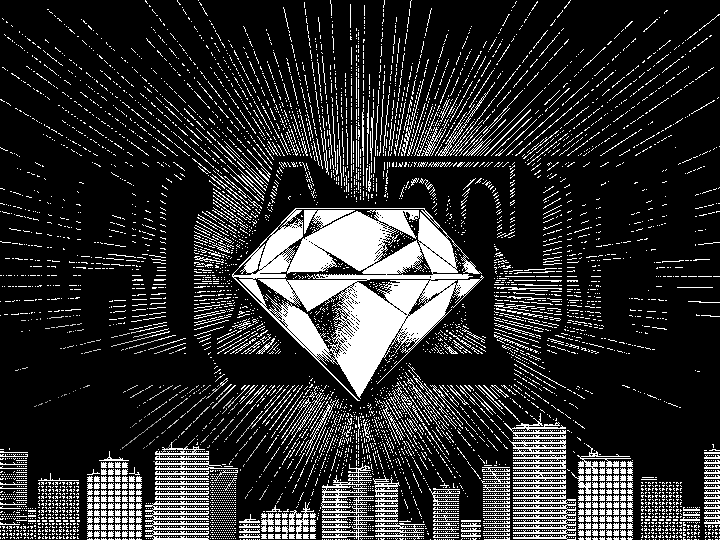
* L. Nichols has a tumblr and she’s posting some knockout shots of murals and other art she did in a local restaurant. I promise you’re more interested in seeing this than you think you are.
* I have to hand it to DC for coming up with an approach to a He-Man and the Masters of the Universe comic book that isn’t appealing to me in a single way. That takes hard work!
* For a brief moment as I scrolled toward it in my Google Reader, I thought this David Bowie photo was a Renee French drawing. Renee, if you’re reading this, you can still make me right.
* Decoding the aesthetics of Beyoncé’s new tumblr. <3 (Hat tip: Beebles.)

* If you’re not familiar with the bracingly frank sex writing of Vanessa at Nightmares and Boners, you should fix that forthwith.
* Glenn Greenwald is writing about the egregious, openly unconstitutional treatment of journalist and documentarian Laura Poitras, but he could just as easily be talking about Julian Assange, Bradley Manning, Occupy protesters, and anyone else who makes the mistake of openly opposing American state power in a way that directly impacts or embarrasses the wielders of that power:
As is true for all states that expand and abuse their own powers, that’s what the U.S. Government counts on: that it is sending the message that none of this will affect you as long as you avoid posing any meaningful challenges to what they do. In other words: you can avoid being targeted if you passively acquiesce to what they do and refrain from interfering in it. That’s precisely what makes it so pernicious, and why it’s so imperative to find a way to rein it in.
See also Greenwald guest columnist Jesselyn Raddack on the Obama administration’s legal actions against journalists. The dark beauty of detainment, harassment, confiscation of personal electronics, mass arrests of and police brutality against nonviolent protesters, press blackouts, and so on is that none of it, none of it, has to stick in a court of law, at all. It’s all a fait accompli. The action’s been taken, and by the time it gets rectified in the near term (you’re released, no charges are filed, you get your computer back, someone gets put on desk duty), let alone in the long term (judicial pushback, as unlikely as that may seem with the current courts), your life has been made vastly more unpleasant, and everyone who sees what happened to you knows that their lives will be made vastly more unpleasant too should they do something similar. Message sent.
* Finally, might you consider Kickstarting my friend Simone Davalos’s fighting-robot documentary RoboGames?


